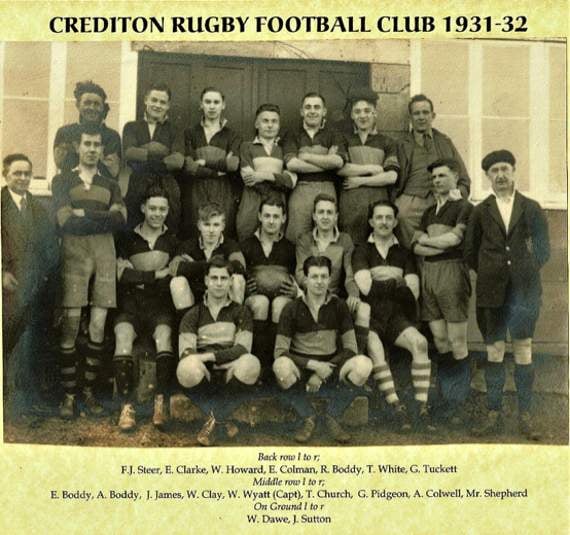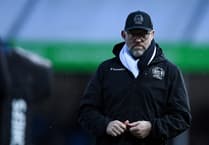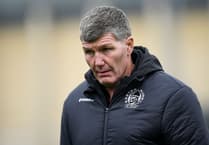CLUB training for the 2020-21 season has begun, even though we do not know when the season will start.
Our new coaches, Nathan Gosling and Stuart Lowe, have started honing players skills whilst Tom Merriman supervises the fitness which, it must be said, is a joy to watch!
The Club is mindful of the "Return to Playing" campaign and the social distance training has been extremely well organised.
All we can do is look forward to games getting under way and one thing is certain, we should be well prepared.
Life was very different 90 years or so ago and during the 20 years between the two World Wars, the Club experienced some highs and some lows, from winning the Devon Junior Cup to going through seasons barely winning a game.
The country itself moved from the euphoria of victory in World War One to the Great Depression of the late 1920’s to mid 1930’s and quickly followed by another World War.
Those who had to live through that period certainly experienced the worst of times that could possibly be imagined.
Things that we take for granted nowadays were simply not available then.
The NHS did not exist, access to reasonable benefits were simply not available, there was high unemployment and no sector was immune to the effects of the Depression. Agricultural areas were hit equally as hard as the industrial centres and one of the few aspects of life that brought relief from the drudgery was sport.
The period immediately after World War One was one of relatively slow progress, playing records generally showed more wins than losses and of course the high point was the 1923-24 season when we won the Devon Junior Cup.
Success should not always be judged on results alone and for six seasons during the roaring 20’s we managed to field a Second XV which, when we had to compete for players with soccer it was a tremendous effort.
Perhaps what was surprising was how quick was the fall from the success of that Cup winning season to a period where victories were very few and far between.
In the four seasons from 1927-28 to 1930-31, we could not manage to reach double figures in terms of wins. The 1930-31 season produced just three victories. Of course, the country was at the peak of the recession which must have had some effect on playing resources.
The 1931-32 season saw the green shoots of a revival although by mid October supporters would have thought another year of despairing results was on its way.
In fact it was the worst start to a season for some years with four successive defeats in which we conceded 65 points. The opener at Tiverton was lost 0-28, the worst possible start imaginable. Then followed defeats at Exmouth Seconds 6-12, at Withycombe 5-14 and at home against Ilfracombe 6-11.
Things changed dramatically with the visit of Plymouth Civil Service to Crediton, a victory at last 8-6 and ironically the first win since we had defeated the same club back in March!
Tries from the captain William Wyatt, Alan B Stoyle and a conversion from Archie Boddy was enough to secure the win.
Three more wins followed, against Sidford 11-8, Wyatt with another two tries plus one from Ernie Coleman and a conversion from Archie Boddy.
Arthur King-Robinson then scored the only try of the game in a 3-0 win against Bideford.
A trip to Barnstaple to play their Second XV which was won 9-8, tries from Archie Boddy, Colwill and Bill Clay secured the single point win.
Four successive victories had been registered for the first time since January 1925 but the run came to an end with a 0-3 defeat at the hands of St Luke’s College and we reached Christmas without losing another game.
Victories against Barnstaple Grammar School Old Boys (11-5) and two draws, 3-3 against Tiverton and 9-9 against Newton Reserves. The two draws were indeed good results and the report of the Tiverton game concluded that Crediton were unfortunate not to have won.
Immediately after Christmas, in fact Boxing Day, we suffered a rare defeat at the hands of a rapidly improving Okehampton team. The 0-3 scoreline reflected the closeness of the game and within two weeks we got our own back with a 9-0 win courtesy of tries from both Reg and Archie Boddy and J Pope.
The season fell away from then on, a run of six successive defeats was halted with two more wins against Barnstaple GSOB 8-0 and Bude 32-8, that was the biggest win recorded since October 1926.
The tries were scored by W. Dawe 2, Reg Boddy, J. Sutton, J. James, Archie Boddy, E. Coleman and W. Howard. F.J. (Gifty) Steer converted three and Bill Clay one.
The season drew to a close with two more wins, two defeats and a draw. Interestingly, the team played for the first time under floodlights in a midweek 3-8 defeat against Exeter Reserves at The County Ground. The new floodlights had been installed during the season and we were invited in to play an evening fixture.
The season finished with 11 victories which equalled the total wins for the previous three seasons added together.
Newcomers to the Club during the season were Fred Steer, better known as Gifty, and Alan B Stoyle, both recruited from soccer and who were to make huge contributions to the Club in the years to come.
The Boddy clan continued to be represented with Edgar still a major presence and who had probably appeared in more team photos than anyone else to-date!
Archie and Reg were both influential players and would continue to maintain the link between the Boddy family and the Club for a few more years.
The following season opened with two draws and no wins in the opening five games of the season, another slow start which seemed to be the norm in recent years.
On the one blank Saturday, October 8, both the soccer and rugby clubs were without a fixture and so played a soccer match.
The round ball players had an easy 10-1 win, Reg Boddy carried his scoring prowess from the rugby field to the soccer pitch and scored the solitary rugby club goal.
Draws were managed at Withycombe and Okehampton although we lost to North Tawton, Thomas Kellys’ XV and Bideford. Thomas Kelly was the Hon Secretary of the Devon RFU and a former County player and England International.
The first win of the season came at home against Okehampton 8-5, Reg Boddy with the try and Archie Boddy with the conversion and penalty.
That was the sixth game of the season and all the points scored to-date had been shared between Archie and Reg Boddy.
The lead up to Christmas brought mixed results, wins were recorded against The Grammar School 6-4, Old Bardians, a Barnstaple team 14-0, and Tamarians 14-3.
Tamarians were a team formed when the Bude and Holsworthy Rugby Clubs decided to join forces.
Another defeat at the hands of Tiverton (0-9) was most unwelcome but there were a couple of drawn games, 3-3 against Cullompton and 0-0 against Exeter Reserves, Christmas Eve and a home game against Bradninch ended 0-0 whilst on Boxing Day, The Liberal Club defeated the Conservative Club 11-8. The year ended with a 0-9 defeat at Tamarians.
The New Year began with a couple of defeats, 0-3 at Teignmouth Seconds and 9-10 at home against Cullompton but there were better times ahead and it really did seem as though the Club was turning the corner.
The remaining games certainly provided hope for the future, seven wins, one draw and two defeats was a much improved return. The highlight was a 7-3 victory over Bideford who had enjoyed an excellent season and won the Devon Junior Cup. It was the first season since 1925-26 that we had won more games than we lost.
Of course, it should be borne in mind that over the years, we had been left behind by a number of other Clubs, the apathy of the late 1920’s had come back to haunt the Club. We were no longer strong enough to take on the First XV’s of the likes of Sidmouth, Paignton or Teignmouth and we were very much in the second tier of Clubs in the County.
We did not have enough players to commit to a Second XV which, in itself, was a problem so far as retaining players was concerned.
The Grammar School was a good recruiting ground and indeed many outstanding players came through that route.
However, many would leave the area and go to University but would turn out for the Club as and when they could. The forming of a Second XV had to be a priority if the Club was to improve the standard of rugby.
Paul Harris





Comments
This article has no comments yet. Be the first to leave a comment.